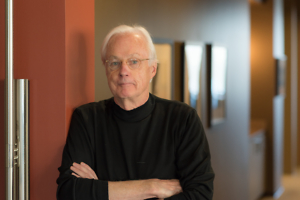Stories, Not Politics
Folklorist Bill Ivey offers a remedy for our fractured society
It might seem unusual for an academic text to feel urgent, but there’s no better word to describe Bill Ivey’s Rebuilding an Enlightened World: Folklorizing America. This important book explores our modern moment, skillfully examining the journey that brought us to this precipice. How did we arrive here, at a society increasingly hostile to human rights, reason, and science? “From the Taliban in Afghanistan to the Tea Party in Des Moines,” Ivey writes, “Enlightenment assumptions have lost authority, are under attack.” He goes on to argue that the noble aims of Enlightenment may have been doomed from the start.
 Readers rusty on their Age of Reason history will appreciate Ivey’s tutorial, starting with the movement’s ideals and moving onto how they were almost immediately misused. For Ivey, the Enlightenment is “civilization’s greatest gift to the world—every life has meaning, rationality and science validate action, and governments enable dreams.” While Enlightenment goals were impressive, their application was often less than perfect, offering an excuse for exploitation. Human rights were lauded, of course, but early views of those rights excluded a lot of people based on race, gender, and even geographical location. The last category is key to Ivey’s argument because it points to why the least educated feel left out by progress. And people who are left out are easy prey for extremists.
Readers rusty on their Age of Reason history will appreciate Ivey’s tutorial, starting with the movement’s ideals and moving onto how they were almost immediately misused. For Ivey, the Enlightenment is “civilization’s greatest gift to the world—every life has meaning, rationality and science validate action, and governments enable dreams.” While Enlightenment goals were impressive, their application was often less than perfect, offering an excuse for exploitation. Human rights were lauded, of course, but early views of those rights excluded a lot of people based on race, gender, and even geographical location. The last category is key to Ivey’s argument because it points to why the least educated feel left out by progress. And people who are left out are easy prey for extremists.
This book asks a big question: how do we salvage the ideas of the Enlightenment, this time without excluding anyone? As Ivey succinctly posits, “Enlightenment didn’t come with an instruction manual.” He does offer some hope: answers, such as they are, might be found in folklore studies. Folklore scholars have long understood that American identity is local, that stories-not politics-are how we understand each other.
This view offers much needed insight into why so many people are willing to believe fake news items, those damning and entirely made-up conspiracy theories presented by websites pretending to be trustworthy organizations. It’s the same impulse that makes people insist that Elvis is still alive and that Bigfoot wanders around forests in the Pacific Northwest. If a friend of a friend claims a story is true, there’s no easy way to check for accuracy but also not much of an impulse to object, especially if the story reinforces our existing beliefs. Narrative—as novelists well know—moves us more than data does.
 Rather than blaming Trump for today’s increased racism, misogyny, and homophobia, Ivey positions the president as the face of a movement that was already brewing, domestically and internationally. A symptom, in other words, rather than a cause.
Rather than blaming Trump for today’s increased racism, misogyny, and homophobia, Ivey positions the president as the face of a movement that was already brewing, domestically and internationally. A symptom, in other words, rather than a cause.
Still, the United States, he believes, should have been immune to some of the nastier strains of nationalism. Folklorists, specifically Richard Dorson and Americo Paredes, have long considered this country to be akin to a borderland. That is, we’re a nation of shared identities rather than one singular identity, a place where cultures interact rather than separate. Of course, that claim makes today’s open rejection of difference even more disheartening.
In a particularly illuminating passage, Ivey takes issue with the phrase “That’s not who we are” and its related adjective “un-American”—as though human—rights abuses are a new thing here. The U.S. has a turbulent history, and it has always been difficult to define a nation populated by people of so many disparate backgrounds and views. Rebuilding an Enlightened World is often bleakly honest, but Ivey does offer a remedy: “We must consider who we are and what we need and then find our way to a new, genuine cosmopolitan spirit—a spirit of respectful curiosity toward the expressive lives [of others].”
Each chapter of this book is grounded in current events-from the maligned D.C. pizzeria Comet Ping Pong and tensions in North Korea, to the success of Black Panther and the Star Wars franchise. Ivey has pulled off a neat trick—making academic theories relatable and compelling.
He is the right scholar for the job, someone who often built his career outside universities. Perhaps most notably for Tennessee readers, he was the director of the Country Music Foundation and the Country Music Hall of Fame and Museum for more than twenty-five years. He also served as the chairman of the National Endowment for the Arts, and he founded the Curb Center for Art, Enterprise and Public Policy at Vanderbilt. While his most recent book dives deep into its subjects, the central lesson is succinct and memorable, one not so far removed from Ivey’s own musical background: “Stories have meaning; it’s time to listen.”

Erica Wright is the author of a new poetry collection, All the Bayou Stories End with Drowned, as well as two mystery novels. Now a senior editor at Guernica, she grew up in Wartrace, Tennessee, and received her M.F.A. from Columbia University.


